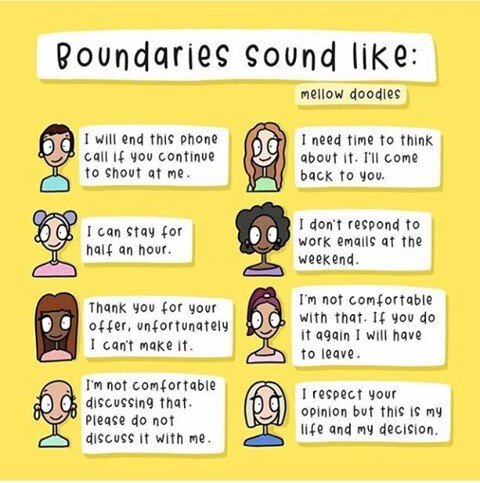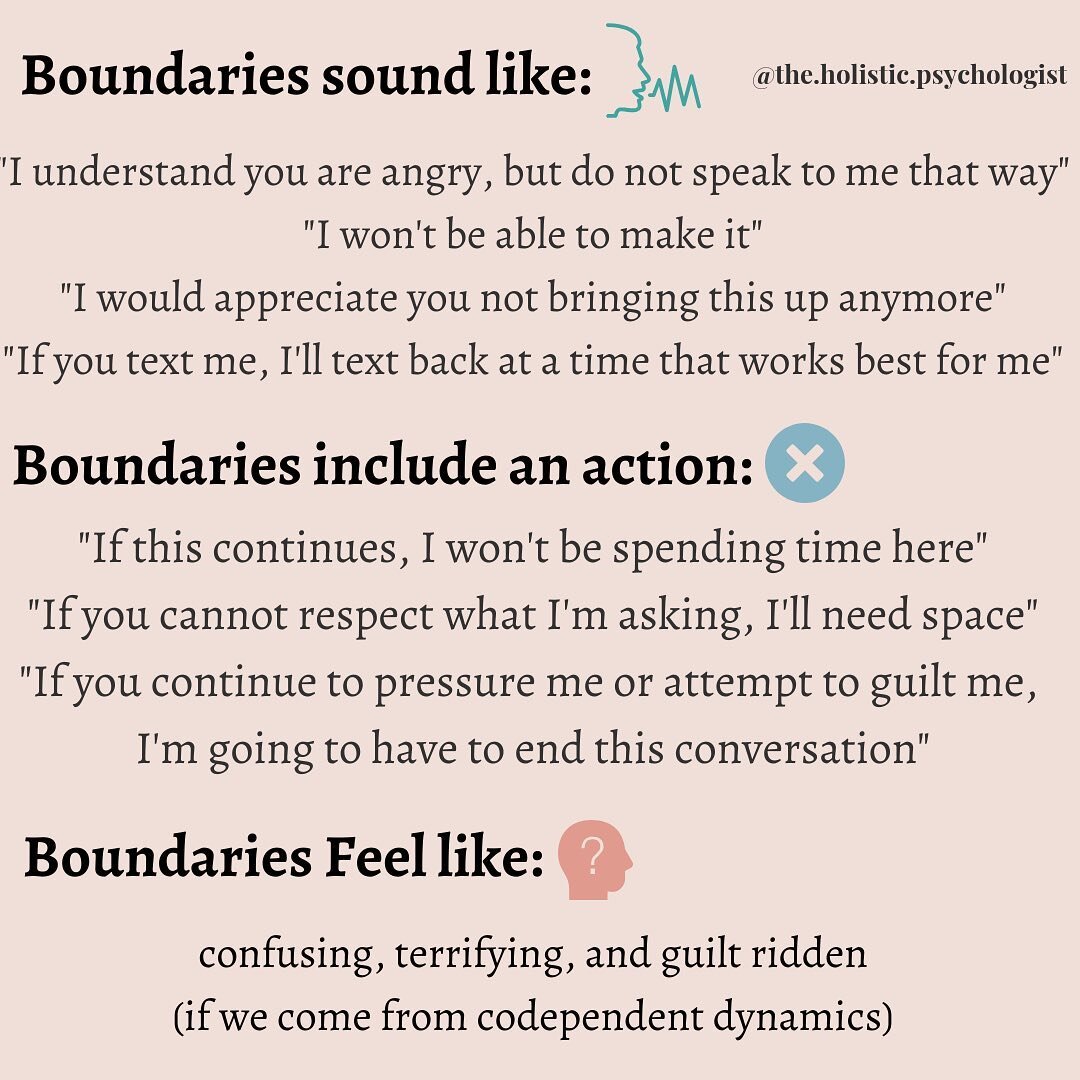Why Do Boundaries Make Us Feel Bad?
by Marissa Pomerance
Few things have dominated the mental health zeitgeist quite like the topic of “boundaries.”
Posts like this are constantly popping up on our feeds:
They are the new “shoulds” of how to create better relationships with the people we love. But how do we translate these theoretical ideas that we “like” in an idealized, digital world, into pragmatic, relational ideas we can actually use in our non-digital lives?
Because while boundaries can seem helpful and freeing and smart and rational, in practice, summoning the courage to say to our moms “no, we’re not seeing family this year for the holidays” seems, uh, well, terrifying?
So how do we advocate for ourselves and our needs but in a way that works for us? And how do we use boundaries to become closer, not further, from all the people we love?
Well. This might be how.
Is boundary-setting language too harsh?
According to Gottman Institute-trained therapist, Hanna Stensby, “boundaries are all about becoming clear on your values and your priorities, and then setting limits around people or activities in your life that don’t bring you joy or don’t make you feel fulfilled.”
So clearly, boundaries are necessary.
And yet, it’s hard not to feel disconnected to some of the boundary setting language we see all over Instagram.
Language telling us to say, “no, I will not come over for holidays,” (even during a pandemic, couldn’t we be nicer about this?), or, “I will not discuss that with you” (shouldn’t we be able to be honest with our loved ones?).
Language like this:
When I imagine saying, “I won’t be spending time here” or “I’m going to have to end this conversation,” to my friends or sister or mother, I start to develop hives. Just the idea of firmly telling my parents that I won’t celebrate a holiday with them, without equivocation, causes me to break out in a cold sweat, echoes of the inevitable Jewish guilt I’ll receive reverberating in my brain.
For some of us—especially those of us with enmeshed families—these kinds of boundaries seem antithetical to what we understand as closeness and intimacy. Our families reward our enmeshed behavior, so we stay enmeshed because it feels warm and cozy and familiar, even if that enmeshment is dysfunctional.
In fact, “one of the main impediments to boundary setting is guilt,” says renowned clinical psychologist, Dr. Ramani Durvasula. “People feel guilty setting a line, and are afraid of hurting feelings. We’re also reluctant to set boundaries for fear of being disliked or rejected.”
So how do we do this without feeling like bad friends, bad daughters, bad people? Well, let’s start here—by remembering that we are not required to do what we read on the Internet. You are not required to do what I’m suggesting in this article that you’re reading on the internet.
If boundary setting language feels harsh, if it creates distance not closeness, if it creates more rifts not fewer, we have to figure out how to create boundaries using our own language. With our own tactics. But knowing what we want as a result of setting boundaries is a crucial first step.
What happened to being selfless?
But even if we’ve mastered the language necessary to setting boundaries, boundaries can still feel counterintuitive to everything we’ve been socialized to believe.
Setting boundaries means, for once, putting ourselves first. Telling our parents that “I cannot be the person you lean on” doesn’t just feel distancing, it feels downright selfish. And haven’t we been taught our entire lives that we should be generous and thoughtful and helpful? Especially….as women?
But the problem here lies with the idea that it’s OK to be miserable, as long as it’s for the greater good. That we should just deal with being the mediator between our parents, even if we loathe that it’s our role in the family system, because we think it’ll preserve the health and happiness of our family.
But, “a relationship is not time served, but rather two healthy people who can hold space and be respectful of each other's boundaries. Saying no may not feel optimal to someone else, but respect of another person's safety is also a part of a human relationship,” Dr. Ramani explains.
Maybe selflessness doesn’t need to look like what we’ve been told it looks like. Melissa Urban, founder of The Whole30, and fierce boundary advocate, believes that “boundaries are not selfish, and they're not just about me. Boundaries are a necessary part of maintaining healthy relationships. Holding boundaries around my friendships and relationships helps me feel safer and more comfortable in them, which allows me to be more vulnerable and trusting.”
What if the most selfless thing we can do for one another is to respect each others’ boundaries?
But aren’t we responsible for the feelings of others?
The obvious, Instagram-y, *clap emoji* perfect answer to that question is “no.” And then someone would comment: say it louder for the people in the back!
But.
Real life doesn’t work like Instagram. And the more nuanced answer, the one we all feel deep down, is that of course we feel a sense of responsibility for how others feel. Telling our parents that they cannot lean on us for emotional support, or that we will no longer spend time with them during the holidays, or that there are topics that are now completely off-limits, feels hurtful. And wrestling with those ideas while also trying to find ways to advocate for ourselves is a huge struggle.
According to Dr. Ramani, “there’s often no way to set boundaries without hurting other people.” But feeling responsible for the feelings of others doesn’t necessarily make us kind, empathetic, loving humans. Instead, this responsibility leads us to try to solve other peoples’ problems and just adds to our own stress and anxiety.
We can still be attuned to others’ needs, and care about their feelings. Of course. But feeling responsible for others’ happiness is a recipe for unhealthy, enmeshed relationships that “devolve into resentment,” says Dr. Ramani.
And perpetuating unhealthy relationship dynamics will not serve anyone’s feelings in the long run. According to Stensby, “if someone is truly invested in you as a person and has unconditional love and caring for you, they will remain in your life.”
So if a relationship doesn’t improve by setting boundaries, well, it probably wasn’t a very healthy or productive relationship to begin with. As Urban puts it, “generally, someone reacting badly to a boundary is upset because you're revoking a privilege they were never meant to have in the first place.”
“someone reacting badly to a boundary is upset because you’re revoking a privilege they were never meant to have in the first place.”
Can we ever take boundary-setting too far?
Boundaries can give us a convenient “out.” They give us a therapist-approved method for never doing anything we don’t want to do again because now we can “say no” and that we “don’t have the bandwidth,” allowing us to close ourselves off to our relationships, our lives, and our responsibilities.
“When boundaries devolve into a place of rigidity, then they are no longer healthy,” says Dr. Ramani. Here’s an example; “I remember once knowing someone who was so obsessed with her child's napping schedule, that meant it was impossible to ever find a time together, or plans would be made 6-8 months in advance and it was a coin flip on whether it would work. Ultimately, the friendship died on the vine, and the only people who could maintain relationships in this scenario were those who had built in daily access to this person,” Dr. Ramani describes.
The problem with boundaries, then, happens when we say things like, “I’m setting a boundary and I will no longer talk to you about this issue ever again,” which allows us to disengage from conversations or honest communication. Which is, in fact, not setting a healthy boundary.
And if boundaries are making our lives tighter and more controlled, or making our relationships worse, then these boundaries aren’t working for us.
Boundaries should look different for everyone.
Setting boundaries can feel shitty because growth often feels shitty.
Growth means climbing out of our safe cocoons of enmeshment, coping mechanisms, people pleasing, and attachment patterns, and emerging as fully-formed adults who no longer rely on the very effective tools and patterns we created in childhood, but which no longer serve us in the present.
But finding that fine line— between the discomfort of the growth that comes from setting boundaries, and the discomfort of saying seemingly hurtful things to people we love— is something we all need to find for ourselves. Which means that WE have to figure out how to find ways to set boundaries that work for us, Instagram be damned.
For some, those boundaries need to be clear and definitive, like for Urban, for whom boundaries were “a matter of life and death.” “I was fresh out of rehab for my drug addiction and to preserve my recovery, I needed to protect my space–sometimes from others, sometimes from myself,” Urban explains. “So I told the friends who still casually smoked pot, ‘to stay friends, you can't do that around me, and don't ever offer it to me.’ I told co-workers, ‘I'm not drinking, but I'll still come out with you after work.’ Holding that space taught me many lessons about how to effectively advocate for myself.”
For Stensby, instead of firmly offering “no,” she says, “let me check my calendar. I'm going to need some time to figure out if I’m available.” According to her, “if setting boundaries is new for you, it can be challenging to find the wording in the moment to respond. So this technique will give you time to craft a response that is compassionate and authentic, but holds your boundaries. Tell your friends and family ‘I’m working on myself and this is something that I’ve decided I am not going to engage in. It’s not because I don’t value you or your opinions or the time with you, but it's something that I need for myself.’”
Got it. Boundaries are big. Now what?
Here are a few expert-approved ideas for setting boundaries in a way that feels more aligned with our real lives and relationships:
Focus on your start-up: We don’t need to say, verbatim, what we read in an Instagram post. Harsh start-ups— meaning, the way we bring up a topic— are a recipe for defensiveness and reactionary responses. So instead, “we can communicate boundaries with a sense of love, compassion, and understanding,” offers Stensby. “Communicating boundaries without any criticism or contempt is key. You can find ways of setting boundaries that are softer. You might say ‘thank you so much for asking. Please continue to ask me. Right now, I don’t have the bandwidth to do that, but I love that you asked.’”
Replace “but” with “and also”: Here’s a trick straight from Urban’s playbook. Replacing “but” with “and also” “helps soften the statement, and reminds people that two things can exist at the same time,” she says. Here’s an example from Urban; “I love meeting you for lunch, and also, when you're late with no warning it's disrespectful of my time. Next time you're running late, please text me.”
Don’t get caught up in psychobabble: “Oftentimes people confuse therapy lingo with disjointed psychobabble,” Stensby explains. “We don’t need to say ‘This needs a boundary.’ Instead we can use an ‘I-statement’ and say ‘what you said made me feel really uncomfortable and hurt and what I need is _____’ ( fill in the blank).’”
Don’t blame: “Take responsibility for your boundary setting,” says Dr. Ramani. “Don't tell a person you are setting boundaries because of them, but take ownership of it.”
Explain: If we’re setting a firm boundary with someone in our lives that we truly love and respect, then that person may deserve an explanation. “To avoid ruptures and lost relationships, you can explain to them why you’re setting these boundaries and over time they will come around,” says Stensby.
Frame them as a positive step in the relationship: Setting healthy boundaries can strengthen our relationships, so why not communicate that? According to Stensby, it’s productive to frame these boundaries by saying things like, “‘I want to show up as my best self for you in this relationship and here are the things that I need to be able to feel like my best self.’ You can also ask them to talk and think about what their boundaries are so that it is a two-way street and you are both working on setting those boundaries together.”
Don’t presume to know their feelings: “Recognize that your boundaries may not feel good to another person, but also don't presume to know what the other person is feeling,” Dr. Ramani explains. "Assuming that they’re devastated that you can’t make it to a party, or that they’re triggered by you saying ‘no’ is actually verging on gaslighting.”
No matter how we set our boundaries— firmly, clearly, softly, gently—we are all fumbling towards the goal of creating and maintaining more authentic relationships with the people we love most in the world. But it’s sort of like organizing our closets. Sometimes it needs to get wildly messy before everything begins to come into focus, and find its place.
Marissa Pomerance is the Managing Editor of The Candidly. She’s a Los Angeles native and lover of all things food, style, beauty, and wellness. You can find more of her articles here.









